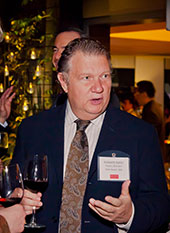Video
In the video above, President Robert A. Brown and members of BU’s International Advisory Board talk about the group’s purpose and its goals. Video by Joseph ChanWith a lobby on the 102nd floor and 16 floors of guest rooms above it, the Ritz-Carlton, Hong Kong, is the tallest hotel in the world. Its windows offer views of Victoria Harbor, Hong Kong Island, and the New Territories beyond, making it the ideal location, symbolically speaking, for a meeting of Boston University’s International Advisory Board, whose mission is to identify new territories in scholarship, influence, and strategy. And so in mid-January, 18 members of the three-year-old board assembled here to talk about ways that the University can engage alumni and enhance its brand around the globe.
“The engagement of the alumni is more important now than at anytime in the history of the University,” says President Robert A. Brown. “There are two reasons for that. One is that thinking about the position of the University in the world cannot be done in a vacuum, and the best group of people to advise you about that are people who live in that world.”
The second reason to have an International Advisory Board, says Brown, is to encourage the philanthropy of appreciative alums in faraway places. “We have a wonderfully operating model for a major private university,” Brown says. “It functions on tuition revenue and research revenue, and it has a relatively small endowment. We are working to increase that base, because that will give us a margin to do things we couldn’t do otherwise.”
Brown points to the example of the recent pledge of $25 million by Rajen Kilachand (GSM’74), whose record gift endows the University’s new Honors College, now named the Arvind and Chandan Nandlal Kilachand Honors College in honor of his parents. Other sizable gifts from alumni abroad are helping to remake areas of BU’s teaching and research.
The president’s efforts to encourage gifts from afar is a natural next step for a university whose international alumni base has been building in strength and numbers. International Advisory Board member and BU trustee Hugo Shong (COM’87, GRS’92) counts about 1,500 alumni in Taiwan and close to 1,000 in China. And those numbers, he says, are growing fast.
“We also set up our own community in this region,” says Shong. “The people try to help each other. For example, when Japan had a major earthquake last year, all of the Asian alumni corps mobilized to provide some assistance to the relatives and families of the alumni in Japan. I think that was fantastic.”
Worldwide, the University has more than 26,000 international alums in 186 countries. There are 53 alumni networks, 4 of which—Qatar, Kuwait, Saudi Arabia, and Turkey—were started this year, and the overseas networks have hosted 43 events since September 2011.
The meeting was the fifth gathering of the International Advisory Board, which first met in London in 2009, next convened in New Delhi in 2010, and in 2011 gathered twice, once in Singapore in January and again in Geneva in June. For the Hong Kong assembly, advisors came from three continents. Shong came from Beijing. Zayed Rashid Al Zayani (GSM’92), who joined the board in 2009, flew in from Bahrain, and Kilachand from Dubai. BU overseer and former trustee Edwin Fuller (SMG’68) came from California, as did overseer Ryan Roth Gallo (LAW’99), and Robert A. Knox (CAS’74, GSM’75), chair of the BU Board of Trustees, came from New York.
The event, a combination melding of minds and networking opportunity, was hosted by Hong Kong–based entrepreneur Michael Lee (GSM’86), whose father, Wing-Tat Lee (SMG’54), graduated from BU. Like Shong, Lee says he has seen a burst of activity among alums in Hong Kong and other Asian cities in the past five years. “In this region, the alumni are very active,” says Lee, “and they see that President Brown is coming to this part of the world more and more. The whole concept of the advisory board is to complement President Brown’s aspiration to propel the University onto a different stage. I think compared to many universities in the United States, Boston University has been much more aggressive, certainly in the forefront of moving outside of the United States. And I think that the International Advisory Board helps President Brown to identify opportunities.”
Al Zayani says he has found board meetings extremely useful, mainly because they air points of view from around the world. “In today’s global world,” he says, “you have to look outside your geographical confines, and having an International Advisory Board can do that. You can get points of view of people who are related to BU in some way, whether studying there or being a parent. It expands the focus of BU, makes it more of an international player than a local, regional one.”
Gallo, who joined the board recently, says the University’s ascent to the global stage requires knowledge that is best provided by an international board. “We have members on the board from the Middle East, from Asia, China, India, from the United States,” says Gallo. “We have people from Europe, and I think it’s important that we have members from as many different countries and as many different perspectives and areas of business and government as we can, because the more perspectives we have, the better the answers we’re going to end up with at the end of the day. It’s inspiring to sit in a room full of people who have reached the top of their areas in business, in a variety of disciplines, and to have a shared, single purpose of helping Boston University in its drive to be great.” ■




Post Your Comment